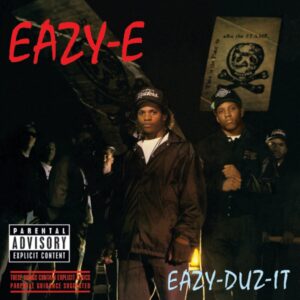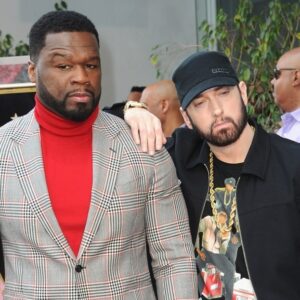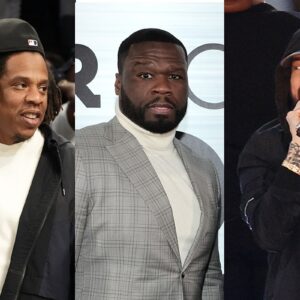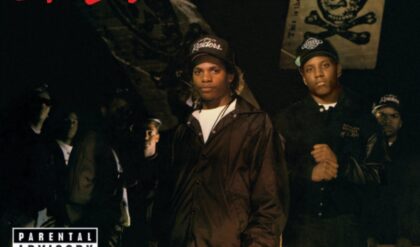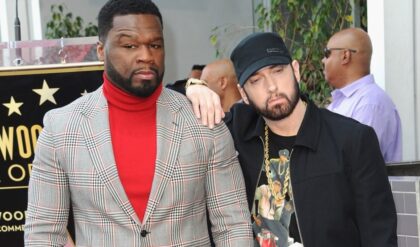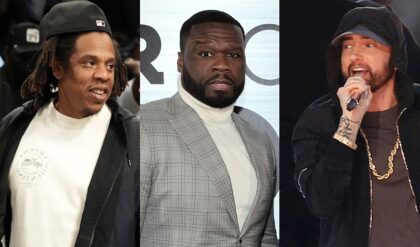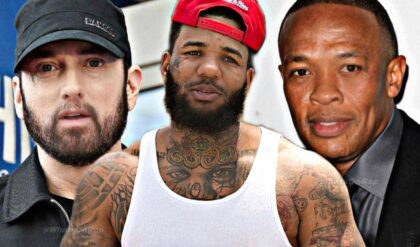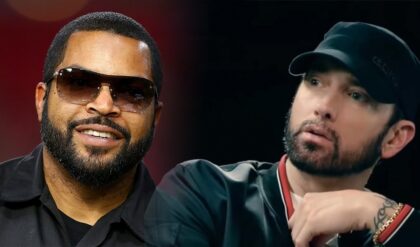For the 20th anniversary of his passing, Eazy’s N.W.A partner in crime Ice Cube spoke with Billboard about his late comrade.

N.W.A. pose for a photo before their performance during the “Straight Outta Compton” tour at Kemper Arena in Kansas City, Missouri in 1989. Raymond Boyd/Michael Ochs Archives/Getty Images
Today marks a significant but very sad anniversary in the world of hip-hop: 20 years ago, on March 26, 1995, Eazy-E died at 31.
For the 20th anniversary of his passing, Eazy’s N.W.A partner in crime Ice Cube spoke with Billboard about his late comrade, describing everything from the first time they met to their eventual reconciliation after a very public beef — and why N.W.A would have recorded another album if Eazy hadn’t died.
Here’s what Cube had to say about his N.W.A co-founder.
When you met Eazy-E, what was the first impression you got of him?
That he was very clean and cool. He was fly. He had a brand new jeep with custom paint on it. He had this Fila sweatsuit on — I knew he had money. He looked like a little hustler, and he was.
So he was better off than you?
Oh hell yes. He was rich compared to me.
And not long after you wrote “Boyz-in-the-Hood,” his pre-N.W.A solo track, for him?
Well, I actually wrote “Boyz-n-the-Hood” for a group of his — it wasn’t for him. He had a group called H.B.O. — Home Boys Only. He was just gonna be the manager. So I wrote some songs and he was like, “I like the stuff you write, I like what you’re talking about. Write a song for my group.” So I wrote “Boyz-n-the-Hood” and they turned it down. But [Dr.] Dre convinced Eazy to do it. Eazy just worked hard. He worked hard, hard, and actually became a pretty good rapper.
So you watched his skills progress from managing a rap group to becoming a rapper himself.
He got better every time he got in front of the mic. He got better and better and better until he was a bona fide rapper. Because it’s one thing to do it in the studio, but when you can do it on stage, you’re a rapper. He could grab the mic — he wasn’t rapping to a track but the instrumental. He could flow on his songs, for sure. He became a good rapper by the time I left [N.W.A].
Did he struggle with the live shows in N.W.A’s early days?
Oh yeah, that’s natural. It’s one thing to do it in the studio and another to do it in front of those people. We were all around him as his support. I think he felt comfortable. We would set the show off first, and then he would make a grand entrance — the tone was already set. The show was going good, we got a show flowing, and 18 minutes into it, you haven’t seen Eazy-E yet. And you’re like, “What the fuck? Where’s Eazy?” And then at the 20-minute mark he appears and it gives the show a whole ‘nother boost until the end. It was just dope.
Could N.W.A have existed without him?
N.W.A would have not existed without Eazy-E. No doubt in my mind. He was bold and not scared of anything. He was 21, 22, I was 16 — to me he was fearless. That’s what he brought. “I don’t want to do no corny ass records that try to get on the radio. I want to do hardcore records about what the hell is going on around here.”
You left N.W.A and they fired some shots at you on their next couple releases (100 Miles and Runnin’ EP and Elif4Zaggin album). When you reconciled, was it more of a truce, or were you on good terms by the time he passed?
We was on great terms. We had finally got it all the way back to where it felt like not just a truce — not just going along to get along because we in the same space — but we was actually enjoying each other and talking about old times and laughing at how we did on the bus or making records. It felt like that the last time I seen him. I thought we were really about to get N.W.A back together and rekindle everything back up. And then he passed away.
If he hadn’t, would N.W.A have gotten together for another album?
Yes, definitely. It was other circumstances that tore us apart. It was more than each other, more than us not liking or loving each other. It was just the fog of being new in the business. All the money and all the fame creates a fog. You can run into each other like helicopters crashing in the desert. You’re on a mission together and when the fog comes in, you can actually run into each other and crash and burn. Or separate or whatever. So after coming out of that fog with clarity, we realized, “We are some super-talented motherfuckers, man. And we can get back together. We can do special things on our own, or get together and do something world-shaking.”
With the Straight Outta Compton N.W.A biopic, it is difficult to tell his part of the story?
That’s the only thing… It’s not difficult because we have his words, his interviews and everything we can find in the archives. Add that with our knowledge of the situation and eyewitness accounts and bring in his wife, Tomica Wright, and you get the picture. Plus Ren, Yella, everybody. What’s not cool to me is I wish he was there. I wish he was right there with us. Because you never know what he would say.
Do you think he’d enjoy the process of making the biopic?
Hell yeah. I think he’d be so turned on by this movie and excited about it. It’s just what the doctor ordered when it comes to the legacy of N.W.A. We deserve this movie. It’s like, why did NWA get together? And why did we do the music that we did? What did the neighborhood do to turn us into what we became in the studio, and what did N.W.A do to change the neighborhood? You gotta make sure all those questions are answered. That’s the essence of N.W.A.
News
Ice Cube Unveils How “Boyz-n-the-Hood” got to Eazy-E
The birth of “Boyz-n-the-Hood” stands as a pivotal moment in Hip-Hop history, unfolding like a butterfly effect. Ice Cube, the mastermind behind the song, initially intended it for the New York City rap group Home Boys Only, signed to Ruthless…
50 Cent Says He Loves Eminem to Death but It Doesn’t Cloud His Judgement
50 Cent Says He Loves Eminem to Death but It Doesn’t Cloud His Judgement In an interview honoring “Get Rich Or Ԁie Tryin’s” 20th anniversary, 50 Cent discusses his experiences as a media mogul and rapper, attempts to make sense…
50 Cent Calls Out Jay-Z for Calling Eminem ‘The White Guy’
50 Cent Calls Out Jay-Z for Calling Eminem ‘The White Guy’ In the ever-evolving landscape of hip-hop, recent headlines have been stirred by none other than 50 Cent, who took to social media to call out Jay-Z for his seemingly…
Justin Bieber thinks Eminem “doesn’t understand” modern rap
Justin Bieber thinks Eminem “doesn’t understand” modern rap Justin Bieber is defending the rap artists of his age. The musician defended “the new generation of rap” using lyrics from Eminem’s 2018 song “The Ringer,” which he uploaded as a snapshot…
The Game Asserts That His Real Reason Behind Eminem Beef Stems from Upset with Dr. Dre
The Game Asserts That His Real Reason Behind Eminem Beef Stems from Upset with Dr. Dre Hip-hop feuds have been an integral part of the genre’s history, often fueled by personal grievances and underlying tensions. The recent revelation by The…
Snoop Dogg reveals he apologized to Eminem after feud: ‘I ain’t perfect’
Snoop Dogg reveals he apologized to Eminem after feud: ‘I ain’t perfect’ Snoop Dogg reveals he apologized to Eminem after feud: ‘I ain’t perfect’ According to Snoop Dogg, he apologized to Eminem in 2020 after their fight got out of hand. There…
End of content
No more pages to load
